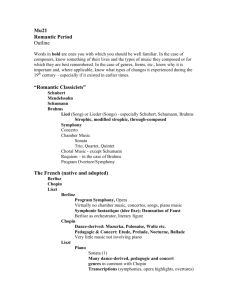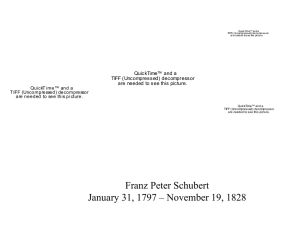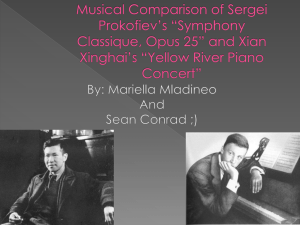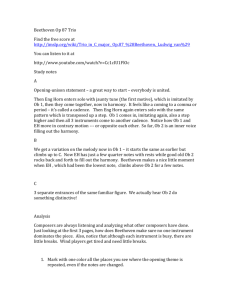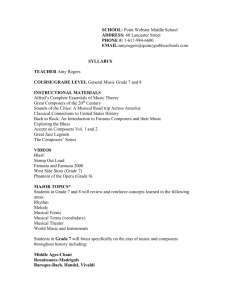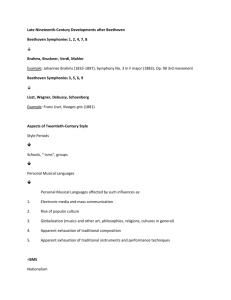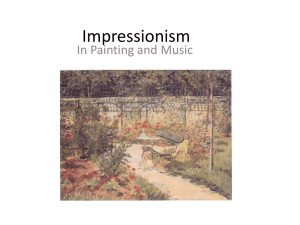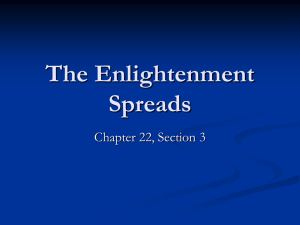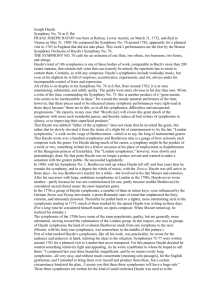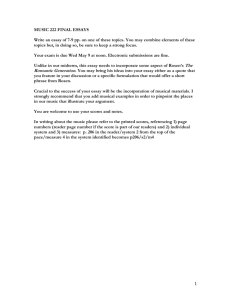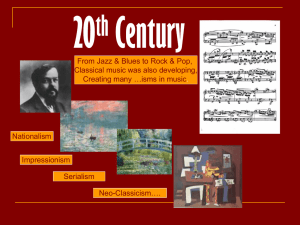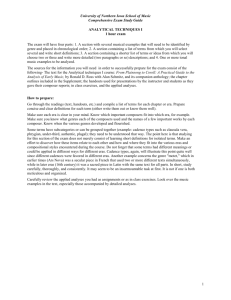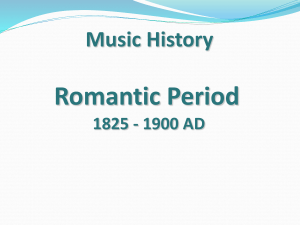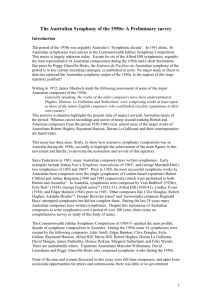Late 19th Century
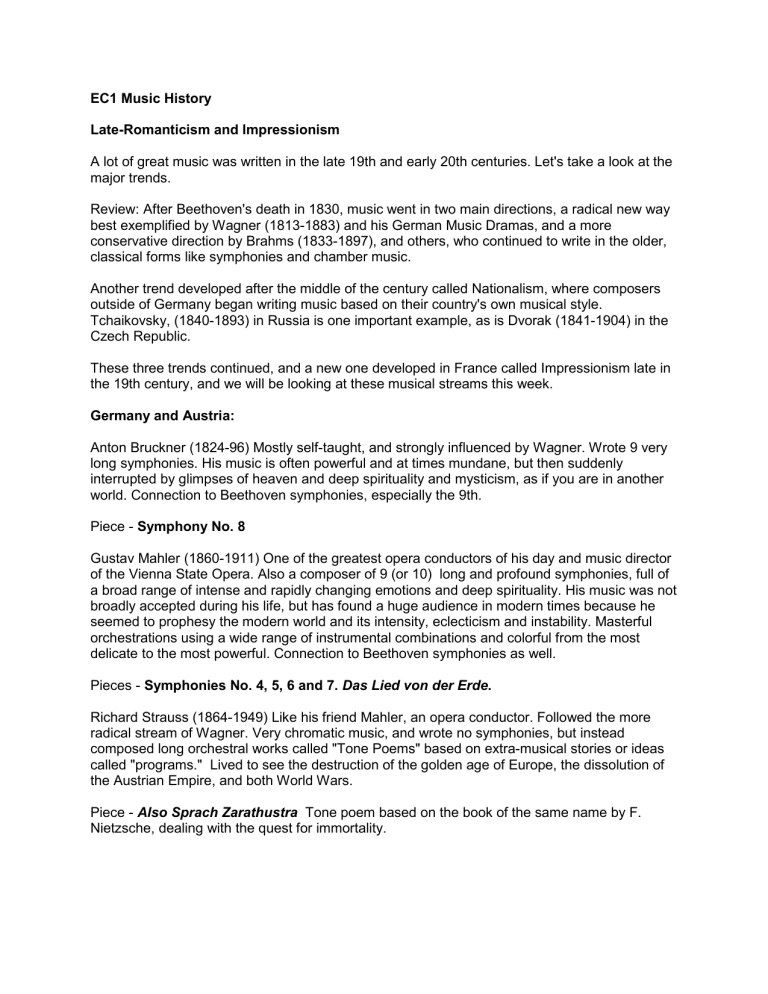
EC1 Music History
Late-Romanticism and Impressionism
A lot of great music was written in the late 19th and early 20th centuries. Let's take a look at the major trends.
Review: After Beethoven's death in 1830, music went in two main directions, a radical new way best exemplified by Wagner (1813-1883) and his German Music Dramas, and a more conservative direction by Brahms (1833-1897), and others, who continued to write in the older, classical forms like symphonies and chamber music.
Another trend developed after the middle of the century called Nationalism, where composers outside of Germany began writing music based on their country's own musical style.
Tchaikovsky, (1840-1893) in Russia is one important example, as is Dvorak (1841-1904) in the
Czech Republic.
These three trends continued, and a new one developed in France called Impressionism late in the 19th century, and we will be looking at these musical streams this week.
Germany and Austria:
Anton Bruckner (1824-96) Mostly self-taught, and strongly influenced by Wagner. Wrote 9 very long symphonies. His music is often powerful and at times mundane, but then suddenly interrupted by glimpses of heaven and deep spirituality and mysticism, as if you are in another world. Connection to Beethoven symphonies, especially the 9th.
Piece - Symphony No. 8
Gustav Mahler (1860-1911) One of the greatest opera conductors of his day and music director of the Vienna State Opera. Also a composer of 9 (or 10) long and profound symphonies, full of a broad range of intense and rapidly changing emotions and deep spirituality. His music was not broadly accepted during his life, but has found a huge audience in modern times because he seemed to prophesy the modern world and its intensity, eclecticism and instability. Masterful orchestrations using a wide range of instrumental combinations and colorful from the most delicate to the most powerful. Connection to Beethoven symphonies as well.
Pieces - Symphonies No. 4, 5, 6 and 7. Das Lied von der Erde .
Richard Strauss (1864-1949) Like his friend Mahler, an opera conductor. Followed the more radical stream of Wagner. Very chromatic music, and wrote no symphonies, but instead composed long orchestral works called "Tone Poems" based on extra-musical stories or ideas called "programs." Lived to see the destruction of the golden age of Europe, the dissolution of the Austrian Empire, and both World Wars.
Piece - Also Sprach Zarathustra Tone poem based on the book of the same name by F.
Nietzsche, dealing with the quest for immortality.
Nationalism :
Tchaikovsky became one of the most popular composers of his time, and ever since. Wrote symphonies, piano music and operas, and very famous for his ballets. His music is strongly influenced by German/Austrian models, but infused with Russian folk music and sensibility.
Pieces - Symphonies 4 and 6. Nutcracker ballet.
More Russian nationalism. Meanwhile, a more completely Russian school of music was developing by the same time, with composers like Rimsky-Korsakov and Mussorgsky writing music with almost completely Russian roots. Irregular rhythms, exotic harmonies, folk melodies.
Pieces - Pictures at an Exhibition. The Great Gate of Kiev
Dvorak and the Czech Republic. One of the most popular composers of this era is Antonin
Dvorak. He wrote 9 symphonies, operas, chamber music, etc. His 9th "From the New World"
Symphony and his cello concerto were written during his stay in the US. His music is similar to his friend Brahms, but full of Czech folk tunes and dances.
Pieces - Cello Concerto, Symphony no. 9.
Impressionism:
Meanwhile, something else completely was happening in France. Claude Debussy (1862-1918) was writing a whole new, unique kind of music that broke conventional rules of melody and harmony, and pointed the way to much of the music of the 20th Century. Although he did not like the term, his music was associated with the Impressionist painters of his day. His music uses conventional sonorities, but in unusual ways, breaking the rules of musical grammar that had been in force for the pervious 200 years. He also added exotic influences of Asian and other non-european music, and newly invented scales. He also developed new, colorful ways of writing for the orchestra. Don't worry if you don't understand all of that - his music is gorgeous and very colorful. Wrote very important works for piano, orchestra, ballet, etc.
Pieces - Three Nocturnes.
Maurice Ravel (1875-1937) Composed in a similar style to Debussy - Piece - Daphnes and
Cloe.
And don't forget! - one of the most important composers for the piano of all - Chopin . (1810-49)
True, he was before all these others, but we have to mention him. Along with Bach, Beethoven and Debussy, one of the most important composers for piano ever.
Major trends - Music reaches a sort of golden age. Symphonies come back. The orchestra attains its full, modern size. Music becomes even more expressive and personal. Composers are some of the most famous people in society. Good times!
Question - what is ultimate reality like, if there is one, and can music connect you to it?
